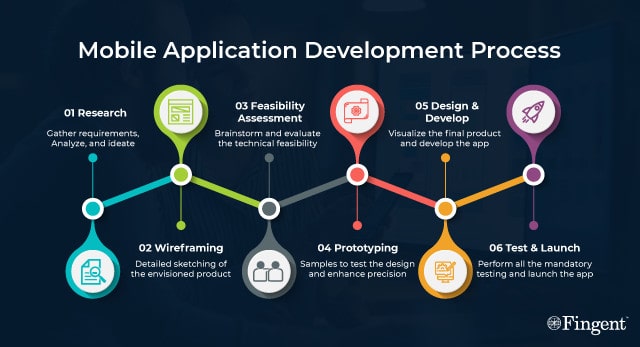Mobile Application Development: Your Ultimate Guide for 2024
A comprehensive guide to developing mobile apps in 2024 and beyond!
- Introduction
- What is Mobile Application Development
- Types of Mobile Applications
- Mobile Application Development Platforms
- Mobile Application Development Process
- Mobile Application Front-end and Back-end
- End-to-end Mobile App Testing
- The Cost to Develop a Mobile App
- Five Reasons Why Mobile Apps Fail and How to Prevent The Let-down
- Tips for Building Successful Mobile Apps
- Develop Your Mobile Application with Fingent
Introduction
Mobile apps – it seems like the world cannot function without them anymore! 2021 has seen a dramatic shift to online shopping. Increased reliance on the digital world pushes businesses to turn to mobile apps to tap a higher customer base. This makes it imperative for businesses to leverage the benefits of mobile application development. Regardless of their size, all businesses can use mobile application development to improve their revenues.
This blog will help you understand all that you must know about mobile application development. We will give you a basic idea of the app development process, different types of mobile apps, and the cost of developing mobile apps.
What is Mobile Application Development?
Mobile application development is the process of creating specific software applications that work on mobile devices. It involves creating installable software bundles, implementing back-end services, and testing the application on target devices. Mobile application development is also about the strategic process of designing, building, and launching a successful mobile app.
Mobile app development is a technique that leverages all the benefits a mobile device has to offer. This process takes into account the limitations of mobile devices and helps businesses to balance cost with functionality.
Types of Mobile Applications
Mobile applications are designed and developed with various frameworks. These include:
1. Native mobile apps
These are developed exclusively for a single platform written on one programming language for a particular operating system, for example, Android mobile apps or iOS mobile apps. As they are built to work on a specific OS or platform, native mobile apps are faster, more reliable, and offer offline capabilities.
2. HTML5 mobile apps
These apps help you enjoy the write-once-run-anywhere approach. Most of the Zoho apps are built using HTML 5. HTML5 mobile apps are compatible with cross-platforms and are cost-effective.
3. Hybrid mobile apps
These apps consist of back-end code and native viewer capabilities. Some of the world’s leading apps, like Gmail, Twitter, Amazon, etc., are hybrid apps. Hybrid apps can take advantage of plugins that allow developers to access the native features of platforms. In addition, they are faster to develop and simple to maintain.
Read more: Hybrid Mobile Apps: When and Why to Choose It For Your Business
4. Progressive web apps
Progressive web apps operate in a browser but act like native mobile apps. This means that no installation is involved, and PWAs are secure, cheaper, faster, and easier to develop.
Each mobile application development approach has its own advantages and disadvantages. Hence choose a method that matches your strategy. Your choice will help you achieve the desired user experience and build native features needed for your application.
Watch video: How To Choose The Right Mobile App Development Approach
Mobile Application Development Platforms
Two important mobile application platforms are iOS and Android. iOS is Apple’s mobile operating system specifically built for iPhones. Android runs on mobile devices manufactured by Google and various OEMs. Though there are many similarities between the two, each of them uses a different software development kit. For example, some of the top Android programming languages include Java, Kotlin, C++, C#, BASIC, Lua, etc. Examples of leading iOS programming languages include Swift, Objective-C, React Native, Flutter, etc.
Besides Android and iOS mobile application development platforms, there are cross-platform development programs such as Apache Cordova, Xamarin, Ionic, Python, Ruby, etc.
Read more: Top Technologies Used to Develop Mobile Apps
Leading mobile application development companies like Fingent help you choose the right combination of programming languages and SDKs for developing your mobile apps.
Mobile Application Development Process
Even with all the evidence pointing in favor of developing an app, it is important to thoroughly run through the mobile application development process. This will help you understand how your application will fit in with your goals and your market niche. Choose a path that will give shape to your vision.
Here is an overview of the mobile app development lifecycle:
- Research: All apps begin with an idea. However, it can be successful only when that idea benefits the customer. Ensure that your analysis includes the demographics, motivations, and behavior patterns of your buyers.
- Wireframing: Drawing a detailed sketch of the envisioned product will help you uncover usability issues. After sketching, wireframing will help refine your idea and organize all components.
- Assess technical feasibility: Asking questions, brainstorming ideas, and reviewing the status will help your team decide the initial functionality’s feasibility.
- Prototype: This step will help you see if you are moving in the right direction. It will also allow different stakeholders to have a first look at your app and validate the information you have gathered.
- Design: Create multiple variations of the screen. The clear visual direction will help you visualize the final product.
- Develop: This is the core phase of the app development process, where you actually develop the mobile app.
- Testing: The app is delivered to users to test the user experience. Their feedback and opinions will help you add what your app lacks from their point of view.
- Launch: Publish your app to the app store. However, plan regular maintenance to fix bugs and enhance user experience.

Having understood the lifecycle of mobile app development, it is vital to learn how ‘front-end’ and ‘back-end’ fit into mobile application development.
Mobile Application Front-end and Back-end
Mobile application front-end and back-end services are two core components of the mobile application.
The mobile front-end (client-side rendering) is the visual and interactive part of the user’s application. In contrast, the back-end (server-side rendering) delivers high-quality mobile applications that delight and retain users. The mobile app’s back-end stores, secures, and processes the data.
Some of the key front-end jobs include web designing, UI designing, UX designing, and front-end development. Back-end developers create the services to process the business logic and access the database, cloud services, and file servers to render the app on the server-side.
For applications where there is no interaction with a server, the role of the back-end and front-end developers can be performed by one person. For applications that require internet connection and interaction with a server, you will need two separate developers for each component.
Read more: Everything a CEO Needs to Know About Software Development Outsourcing
End-to-end Mobile App Testing
To stay on top of the competition in the mobile application market, you must test your application before starting the actual sprint. Here are nine steps to ensure the success of your mobile application:
- A developer must outline the list of all the cases and create a test plan.
- Decide whether the test will be manual or automated.
- Define test cases for different functionalities.
- Begin with exploratory manual testing as it does not require the initial investment.
- After detecting the patterns of outcomes and the frequency, consider automating the predictable ones.
- Start the sprint with usability and beta testing.
- Access the performance of the entire system.
- Conduct security and compliance tests to deal with exceptions and unpredictable situations.
- Launch the application to the app store and fix any issues.
These steps of mobile application testing ensure the efficient and enjoyable performance of the entire system.
Read more: Mobile app development: 4 tips to consider
The Cost to Develop a Mobile App
Ballparking the cost of mobile app development is anything but straightforward. Partly, it depends on your choice to develop it in-house or to hire an app development agency. Building an in-house team will incur additional costs such as office space, hardware, and software requirements.
On the other hand, if you choose to hire a mobile app development agency, you can enjoy a cost-efficacy and competitive advantage. These include the agency’s location, experience, and size. It also consists of the complexity of your app and back-end scalability.
Read more: Are you planning to develop a mobile application for your business? Then explore our template and share your requirements with us. We will get back to you with a ballpark estimate.
Five Reasons Why Mobile Apps Fail and How to Prevent The Let-down
Though mobile application development technologies advance year over year, the failure of mobile applications has been a concern for entrepreneurs. However, only ill-planned and ill-executed apps are set to fail.
It is critical to identify the pitfall areas and turn them into positives. Here are a few reasons that can lead to poor mobile applications. You will also find a few tips that help you to avoid mobile application failure.
1. Lack of market research
A tiny mistake in mobile app adoption can quickly turn into a major disaster. If your app does not address your target market needs, then it will not get downloaded. Even if it is downloaded, it may not be used after the first try. A great dream can thus quickly turn into a nightmare that leads to disappointment.
What can you do?
First, do not rush into creating a mobile app. Instead, begin your mobile app development by conducting detailed user study /market research. For your research to be effective, ask yourself, ‘which solution will my app provide that my target audience needs?’
To answer that question, you must define your target audience and investigate further about them. Understanding your market and your specific users will help you create an app tailored to what they actually need.
Second, know your competition. Do a competitor analysis to improve your mobile strategy. Doing so will help connect your idea with your target audience.
2. Lack of robust mobile app strategy
Without a well-designed strategy, your app will fail. This is especially true if you are new to the industry. A poor move at the strategy level is one of the key reasons for mobile app failure.
What can you do?
Every successful mobile app development is a result of a great strategy. It is a creative effort to incorporate consumers’ needs into an app that can accomplish a specific task quickly and effectively. Goal setting is an essential step. Here are some questions you can ask yourself:
- What will be my mobile app’s selling point?
- What features should I incorporate?
- What benefits will my app offer the user?
Such clearly defined goals will help you quickly map out your strategy.
3. Lack of good design
Poor app design and development can lead to bad business because users will ditch your app in the first crucial 8 seconds if the design isn’t great. Substandard coding and improperly implemented technology will lead to epic failures.
What can you do?
Remember, great design can bring in happy customers. Unfortunately, skipping the testing process is often the reason why some apps fail. Smart mobile app developers take time to conduct several QA tests throughout the creation of your app. This will help you deliver an app that is bug-free and user-friendly.
4. Failure to execute the plan precisely
You may encounter some serious competition in your industry. Or your team may experience some conflicting priorities from some key members. Another possibility is that you may run out of cash.
What can you do?
- Your mobile app can succeed if you have an original idea to offer something appealing to your target audience
- Ensure to work with people whom you can trust. And cooperate with your mobile app development partner
- Have a conservative budget that is well planned and generously funded
Following these steps will ensure that you have the money to build and launch your app successfully.
5. Failure to market your app
After all the hard work, it might still fail if you do not market your app rigorously.
What can you do?
- Have a crystal-clear marketing message aimed at your target customers
- Focus on the solution
- Explain how your target user can benefit from it
- If possible, plan to offer discounts and other perks to attract users
Marketing your app clearly and effectively will ensure that your customers do not move on to your competition.
Tips for Building Successful Mobile Apps
Did you know that, on average, a user spends 20 minutes on a mobile app each day? Another incredible fact is, the app installs increased by 31% in 2021. Furthermore, it is expected to surge in the coming years. This means there is hope for your app. Read on to find out how to approach building a successful mobile app that achieves your business goals.
- Be Agile but know your limits: Being agile and quickly reacting to the ever-changing needs of our customers leads to success, but it comes with a price. It is important to know when to be agile.
- Be alert to risks: Be enthusiastic and optimistic about your product but be realistic about the risks and problems. Identifying the risks early will help you react faster and more accurately.
- Build trust: Make your users feel unique and appreciated. Transparency and trust are the foundation for genuine interactions between the application and its users. To achieve this, you can create a trustworthy rating or review system and a functional service system.
Read More: Building a Business Mobile App in 2021? Here’s What You Need to Know
Develop Your Mobile Application with Fingent
The increasing adoption of remote work culture, online shopping, telemedicine, and e-learning has surged the demand for portable devices, particularly smartphones and tablets. This again has increased the need for mobile apps across all lines of business. According to App Annie’s forecast, the number of mobile app installs will reach 258 billion by 2022, an incredible 45% rise from 2019.
Fingent specializes in mobile app development, and our experts can help position your app for success right from idea to launch. In addition, leading B2B review firms like Clutch and Business of Apps have recognized our mobile app development expertise. Contact us to know more.
Stay up to date on what's new

Recommended Posts

21 Jul 2023 B2B
How Biometric APIs Will Replace Passwords on Mobile Apps
Technology successively progresses all around us; from the simplest basic Google searches to the working of aircraft, technology has indented its value in everyday life. Biometric APIs are not a……

14 Jun 2023 B2B
How Artificial Intelligence Can Help Create Transforming Mobile Apps!
Today we live in a world where machines possess an extraordinary ability to learn, reason, and make decisions, much like the human mind. This remarkable realm of technology known as……

22 Nov 2022 B2B
React Native, Flutter, Ionic, Xamarin – A Comparison Between The Top Mobile App Development Frameworks
Frameworks are the backbone of mobile app development. They are essential to building dependable apps quickly. When choosing a framework, you can choose between native or cross-platform applications. Though both……

24 Oct 2022 B2B
Providing Seamless Customer Experience with Technology
Customer Experience – Two words that could make or break your business. Today, customers expect businesses to provide nothing short of an excellent customer experience whenever and however they shop.……
Featured Blogs
Stay up to date on
what's new


















